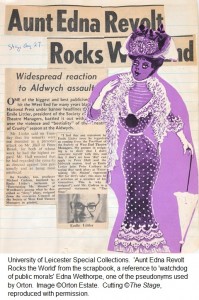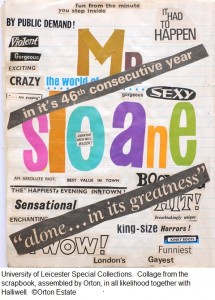When Joe Orton’s play Entertaining Mr Sloane was performed in the West End in 1964, it provoked both virulent criticism and glowing praise – he enjoyed both in equal measure. The critic W.A. Darlington was particularly disgusted. ‘Not for a long time have I disliked a play so much …’ he wrote. ‘I feel as if snakes had been writhing round my feet.’
Orton delighted in collecting press clippings and assembling a scrapbook, which is perhaps one of the star exhibits in the current exhibition in the Library to mark the 50th anniversary of Sloane, ‘Joe Orton in 1964’. Orton underlined Darlington’s last comment, which he clearly enjoyed. Orton gleefully joined in the public debate about his plays himself, corresponding under the pseudonym of Edna Welthorpe. ‘I … was nauseated by this endless parade of mental and physical perversion,’ Edna wrote to The Daily Telegraph. ‘And to be told that such a disgusting piece of filth now passes for humour!’
Orton loved nothing more than observing the general public going about their business – on buses, in the street, in libraries, in the theatre watching his own plays. ‘I usually mingle with the audience,’ he commented.
By Orton’s own admission, one particular episode in 1962 had played a crucial role in his development as a writer. On 5 May, Orton and his partner Halliwell were arrested for the theft and defacement of books from Islington Public Libraries and sentenced to 6 months in prison. Photos of some of the defaced book covers feature in our exhibition. ‘Libraries might as well not exist; they’ve got endless shelves for rubbish and hardly any space for good books …’ said Orton, by way of explaining his motive. ‘I did things like pasting a picture of a female nude over a book of etiquette …’ he went on. ‘I discovered that Gollancz books had blank yellow flaps and I used to type false blurbs on the insides. My blurbs were mildly obscene. Even at the trial they said they were only mildly obscene … I used to stand in corners after I’d smuggled the doctored books back … and then watch people read them. It was very funny, very interesting.’ His delight in people’s reactions to the books was surely pivotal to Orton’s fascination with this pastime.
‘I tried writing before I went in the nick … but it was no good,’ Orton famously said of his time in prison. ‘Being in the nick … brought detachment to my writing. I wasn’t involved any more and it suddenly worked.’

‘Aunt Edna Revolt Rocks the World’ from the scrapbook, a reference to ‘watchdog of public morals’ Edna Welthorpe, one of the pseudonyms used by Orton.
John Lahr, Orton’s biographer, observed that, in Orton’s hands, farce becomes subversive, ‘a serious statement about society … Everything that is painful and horrible is there for the audience to see and know and the funny thing is that we don’t see it and don’t know it.’ Orton watched his audiences closely and was very aware of this tendency in them, as he told an interviewer: ‘… they say, “Well, these are totally unbelievable characters” … “I don’t understand what you are making a joke about.” Even if they may be living exactly the same way at home themselves.’
The exhibition, using correspondence, scripts, press cuttings and photographs from the Archive, runs until 31 August 2014. You can find the Special Collections display case in the basement of the David Wilson Library. Entry to the library is free but controlled, so if you are not a student or member of University staff, please ask to be let through the barrier. Details of staffed opening hours are available on the library website.



 Subscribe to Margaret Maclean's posts
Subscribe to Margaret Maclean's posts
Recent Comments